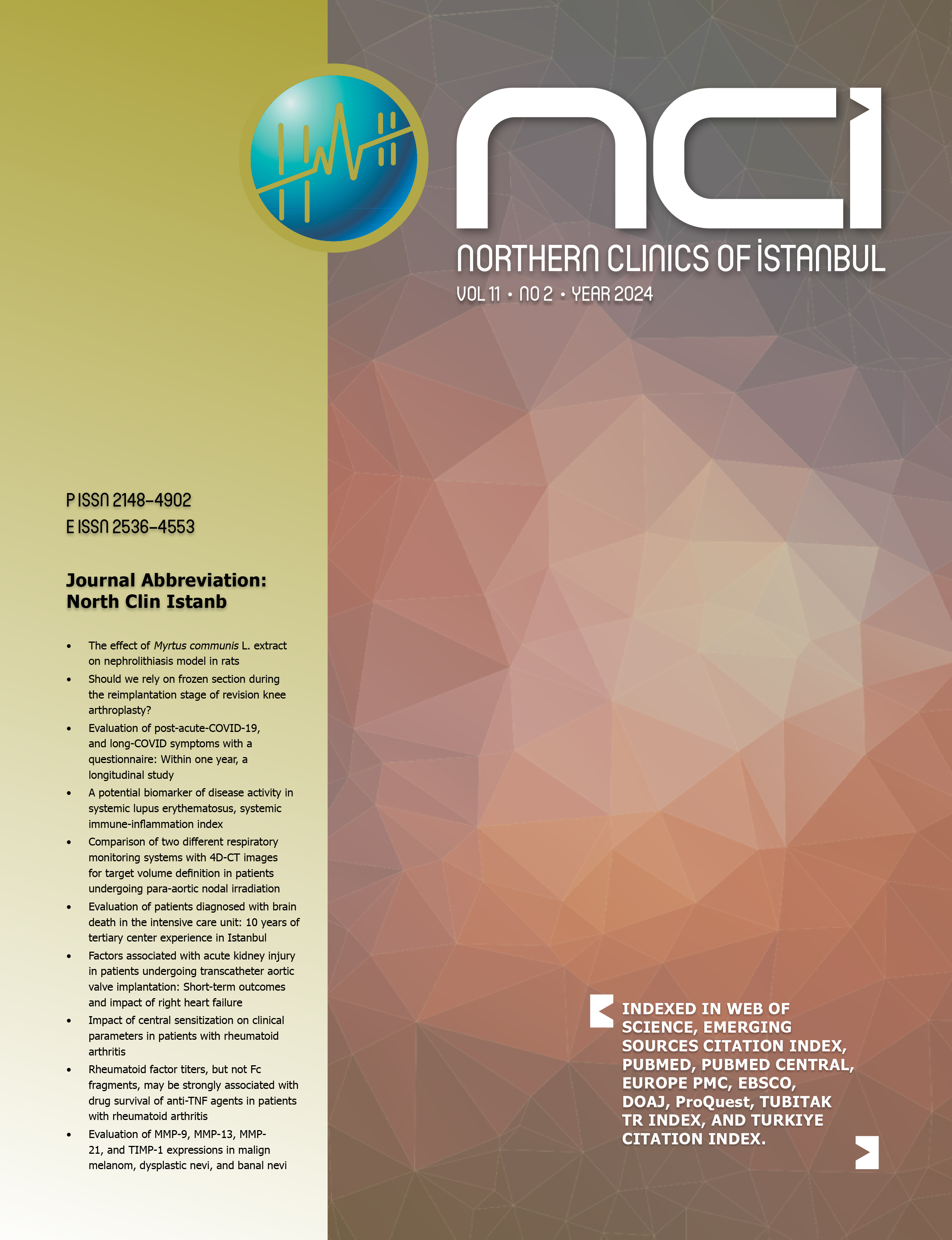Evaluation of the relationship between acute kidney injury and renin angiotensin system inhibition in COVID-19 patients
Ezgi Ersoy Yesil1, Hasan Kayabasi1, Dede Sit1, Mustafa Behcet Demirbas1, Ozlem Pehlivan2, Aylin Arslan3, Tutku Aydin3, Zeynep Gokcin31Department of Nephrology, Umraniye Training and Research Hospital, Istanbul, Turkiye2Department of Rheumatology, Umraniye Training and Research Hospital, Istanbul, Turkiye
3Department of Internal Medicine, Umraniye Training and Research Hospital, Istanbul, Turkiye
OBJECTIVE: In patients with coronavirus disease 2019 (COVID-19), acute kidney injury (AKI) may alter the clinical course and outcome of the disease. In this study, the association of AKI with renin angiotensin system (RAS) inhibitor treatment and its clinical consequences were examined in COVID-19 patients admitted to our hospital during the initial stages of the pandemic.
METHODS: A total of 407 patients between 18 and 85 years of age (202 male and 205 female) admitted to the Umraniye Research And Training Hospital between May 2020 and August 2020 with a diagnosis of COVID-19 were included in the study. Patients were categorized as follows: Group 1, subjects with no chronic conditions (n=150); and Group 2, subjects with comorbid conditions (n=257). Group 2 was subdivided into Group 2A (receiving angiotensin receptor blocker [ARB])/(angiotensin converting enzyme inhibitor [ACEI], n=81), and Group 2B (not receiving ARB/ACEI, n=176).
RESULTS: Hypertension was the most frequent comorbid condition (36.4%). There was no difference in survival rates between the patients who used RAS inhibitor and the ones who did not based on log rank test (p=0.342). Fifty-four patients (13.4%) had developed AKI during the time frame of the disease. In patients with chronic diseases such as hypertension, the use of RAS inhibitory medication was not associated with developing AKI (OR 95% CI: 0.3171.358; p=0.256). The survival rate of the patients with AKI was significantly lower than patients without AKI (p<0.0001).
CONCLUSION: COVID-19 may cause renal injury represents a risk factor for mortality. Therefore, detection of renal injury has a particular prognostic importance.
Keywords: Acute kidney injury,Covid 19, renin angiotensin inhibitors
COVID-19 hastalarında akut böbrek hasarı ile renin anjiyotensin sistemi inhibisyonu arasındaki ilişki değerlendirilmesi
Ezgi Ersoy Yesil1, Hasan Kayabasi1, Dede Sit1, Mustafa Behcet Demirbas1, Ozlem Pehlivan2, Aylin Arslan3, Tutku Aydin3, Zeynep Gokcin31Ümraniye Eğitim ve Araştırma Hastanesi Nefroloji Bölümü, İstanbul2Ümraniye Eğitim ve Araştırma Hastanesi Romatoloji Bölümü, İstanbul
3Ümraniye Eğitim ve Araştırma Hastanesi İç Hastalıkları Bölümü, İstanbul
Giriş: Koronavirüs enfeksiyonu (COVID 19) hastalarında akut böbrek hasarı (ABH) hastalığın klinik gidişi ve sonuçlarını değiştirebilmektedir. Bu çalışmada pandeminin erken dönemlerinde hastanemize başvuran Covid 19 hastalarında ABH gelişimi ve renin anjiotensin inhibitör (Ras inhibitörü) kullanımı-nın hastalık klinik gidişatı ile ilişkisini inceledik.
Yöntem: Çalışmaya Mayıs 2020- Ağustos 2020 tarihleri arasında Ümraniye Eğitim ve Araştırma Hastanesine başvuran Covid 19 tanısı alan 18 ve 85 yaş aralığında toplam 407 hasta (202 erkek, 205 kadın) dahil edilmiştir. Hastalar kronik hastalığı olmayan (n: 150) grup 1 ve komorbid hastalığı olanlar olarak (n: 275) grup 2 olarak gruplandırılmıştır. Grup 2 anjiotensin konverting enzim inhibitörü (ACEi) /anjiotensin reseptör blokeri (ARB) kullanımına göre grup 2a (ACEi/ARB alan, n: 81) ve grup 2b (ACEi/ARB almayan, n: 176) ola-rak da ikiye ayrılmıştır.
Bulgular: Hipertansiyon en sık görülen komorbid hastalık olarak tespit edildi (%36,4). Log rank testi-ne göre Ras inhibitörü kullanan hastalar ile kullanmayan hastaların yaşam oranların arasında farklılık saptanmadı (p: 0.342). 54 hastada (%13.4) hastalık sürecinde akut böbrek hasarı gelişmişti. Hipertansi-yon gibi kronik hastalığı olan hastalarda Ras inhibitörü kullanımı ile akut böbrek hasarı gelişimi ile ilişki saptanmamıştır (OR %95 CI: 0.317; p: 0,256). ABH gelişen hastalarda sağkalım oranı ABH geliş-meyen hastalara göre anlamlı derecede düşük saptanmıştır (p<0.0001).
Sonuç: Covid 19 mortalite açısından bir risk faktörü de olan böbrek hasarına neden olabilir. Bu yüz-den renal hasarın tespiti özellikle prognostik bir önem taşımaktadır. (NCI-2022-7-12/R1)
Anahtar Kelimeler: Akut Böbrek Hasarı (ABH), Covid 19, Renin anjiotensin inhibitörü
Manuscript Language: English





















